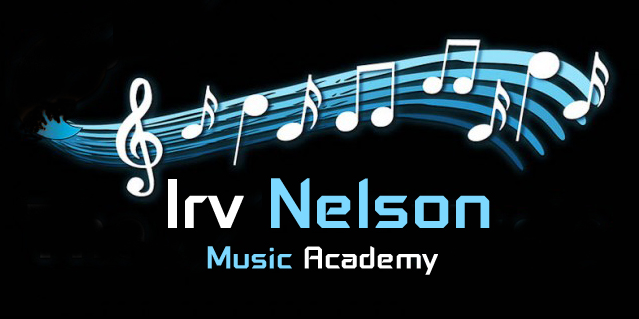
Contemporary Music Instruction and Mentoring
Irv's Musical Journey
I started playing my grandma's
piano, by ear, at the age of two.
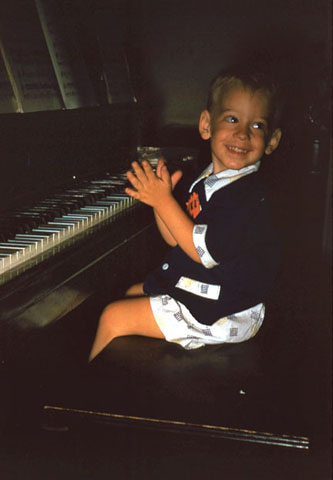
At age eight, I started classical piano lessons, and continued for the next eight years. For six of those years, I studied under one of the most respected teachers in the Salt Lake valley. Although I was honored to have been accepted as one of her students, much of the time I felt like a square peg in a round hole.
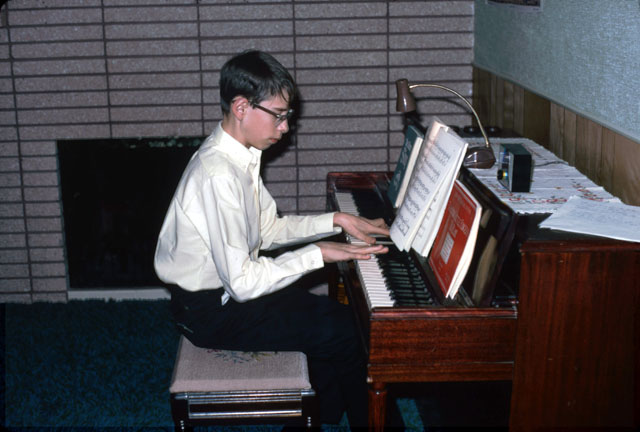
Age 13
I
loved playing the piano, and spent hours and hours
practicing. But I frustrated my teacher by not
spending as much time on the assigned scales, boring Hanon
exercises, and icky Bach Inventions as she wanted. I
was much more interested in experimenting, figuring out how
to play songs I'd heard on the radio, and composing my own
songs. I loved Chopin, Clementi, Beethoven and many
other classical composers, but I wasn't fond of others, and
was never given a choice in the pieces assigned. All
of my teacher's students learned the same pieces, in the
same order, all the way through her program, which was
geared towards one thing: preparing concert pianists to
compete in classical piano competitions... which didn't
interest me at all.
Because I loved music, I didn't give up. But sometimes I felt like I was beating my head against a brick wall. For example, I couldn't figure out an intuitive system for learning the notes in the grand staff and finding them quickly on the piano, let alone how to read the notes above and below the staff. The "Every Good Boy Does Fine" type tricks were not intuitive for me. It was just kind of expected that I would know all the notes. As I progressed, more and more pieces had notes high above the top of the staff, and I found myself just guessing what they were, or if that didn't work, counting lines and spaces.
I discovered that if I was familiar with the assigned piece I could learn it much faster... and I also liked the piece much better. I didn't know it then, but I was using a combination of ear and reading. My teacher knew exactly what was going on, and she did not like it at all! She tried in vain to get me to stop relying on my ear and to just use my eyes and play what was on the page by rote. She refused to play pieces for me when she assigned them, and acted like I was a horrible student for asking her to do so. If we had had the Internet in those days, I could have searched YouTube for each piece and listened to it a couple of times before trying to learn it, but we didn't. And so I suffered, and never reached my potential.
Even though I struggled and eventually quit lessons at age 16 because of my frustration with the structured curriculum, the impersonal teaching style, and the classical-only repertoire, it wasn't all bad. I am very thankful to my piano teacher for drilling into me excellent technique (hand and body position, relaxed wrists, curved fingers, and correct fingering).
In sixth grade, I composed my first piano solo piece. At the time, I was the pianist in the elementary school orchestra, and decided to write an arrangement of the song for the orchestra: first and second violin, viola, cello, bass, and piano. The teacher was impressed, and the orchestra learned and performed the song.
In seventh grade, I did my first recording session of an original composition (on a borrowed reel-to-reel two-track tape recorder, so I could record piano on one track and organ on the other--that was really high tech in 1966!)
During my Junior High years, many evenings, when my parents thought I was asleep, I often laid in bed with my "transistor radio" pressed against my ear, at a low volume, listening to the amazing songs of the late 1960s. The next day, I would listen to the radio, hoping a certain song would come on, and when it did I would record it onto a small reel-to-reel tape recorder (and later, onto a cassette tape). (I had no money to purchase the records and, of course, there was no Apple Music, YouTube, or Spotify.) Then I would take the tape recorder downstairs to the piano and try to play along with it to learn the song. Through trial and error, I invented a system: I would press the "play" button, listen to the first chord of the song, and stop the tape. Then I would hum the top note and find it on the piano. Then I'd rewind the tape, play that one chord again then stop the tape, listen for the bass note, hum it, and find it on the piano. Then it was a simple matter of experimentation to find the third note of the chord. Then I'd repeat the process for the second chord in the song. Before long, I progressed to the point where I could find all three notes at the same time, and soon I was able to listen to a measure at a time, then a line at a time, and eventually an entire verse of a new song, and reproduce it on the piano without difficulty. I even got the the point where I could "see" the chords in my mind when I wasn't sitting at a piano. Sometimes I was able to anticipate the next chord of a song when hearing it for the first time. I discovered how to invert chords, as well as the different types of chords, and chord progression patterns, all on my own. Because I couldn't sing as high as most of the records, I was also forced to learn to transpose so I could sing the songs. Nobody taught me any of that stuff. I just figured it out on my own.
Likewise, nobody ever explained to me how to write down any of this cool stuff I was discovering. Then at age 17, I bought my first guitar and taught myself to play it. That is when I learned about chord charts, which are commonly used with guitar. It didn't take long for me to figure out that I could also write chord charts for the popular songs I was learning by ear on the piano.
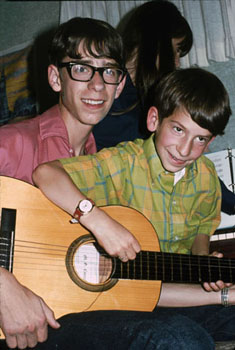
Age 17, with my little brother
During the latter years of my classical piano training, I was also expanding my classical musical knowledge by playing viola for four years in my junior high and high school orchestras.
In my junior year of high school, I attended a concert that changed my life. The University of Utah a'Cappella Choir was on tour in Germany, where I happened to be living for a few months. I had never before heard a'Cappella choral music, and it absolutely thrilled me to the core of my soul. That night, I said to my self, "Someday, I'm going to be in that choir." Upon my return to Utah, I quit the orchestra and signed up for high school concert choir for my senior year.
At age 19, I volunteered to serve a mission for my church and spent two years in Arizona and Nevada. While serving in Las Vegas, there was a beautiful, 11-rank pipe organ in one of the church buildings, and I fell in love with the sound of it. I became so fascinated with it that, on preparation days, when the other missionaries were in the gym playing basketball, I was in the chapel, teaching myself to play that organ. Although I had not liked Bach piano pieces, I discovered that I loved his organ pieces, and learned several of his preludes and fugues. (Since then, I have been the main organist in the church congregation wherever I have lived. Although I have never had an organ lesson in my life, I have been told by many people on countless occasions that I am one of the best organists they have ever heard.)
When I arrived at the University of Utah at the age of 21, I decided to major in accounting. In hindsight, I'm not sure if that was a good decision. My thinking was that I could always do music for fun, but I needed to feed my future family. So I followed my brain instead of my heart, and pushed through a five year bachelors/masters accounting program in accounting in 3 1/2 years, graduating magna cum laude. However, I never stopped studying music. I took a few courses in music theory and pedagogy, and sang in a couple of excellent choirs, in one of which I was asked to be the assistant conductor. Finally, in my master's year, I achieved my goal of being accepted into the University of Utah a'Cappella Choir.
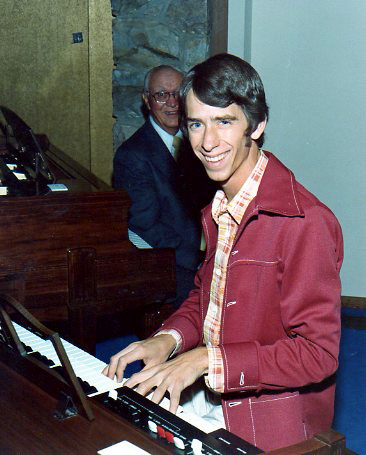
Age 22, playing at a wedding reception
I put myself through college with money earned by playing piano and organ for weddings, and by playing in bands. I was a member of several bands, none of which was particularly good, but they gave me some performing experience. Things changed during my masters' year, when I joined a Top 40 cover band named Christopher that became one of the top three bands in the Salt Lake valley in the early 1980s. That band was extremely demanding, learning several new songs each week. Of course, there was no sheet music, so that experience further developed and refined my ability to learn songs by ear. And the vocal harmonies in that band were extremely intricate and precise, which further developed my voice and my understanding of harmony.
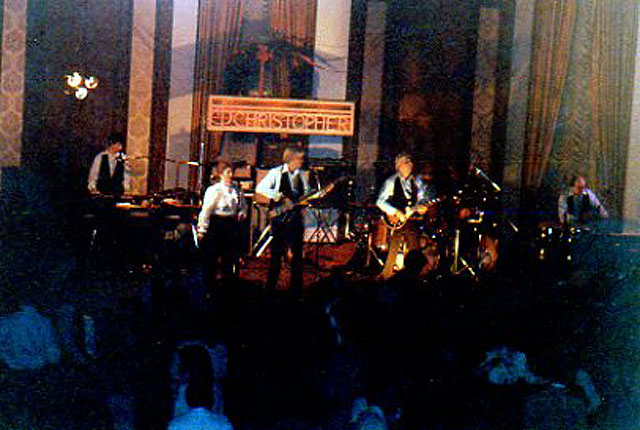
Age 28, playing with Christopher, in the Hotel Utah Grand Ballroom
(where the theater is in the Joseph Smith Memorial building today)
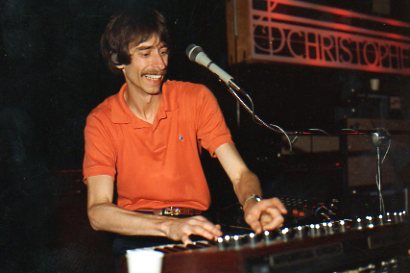
My keyboard setup in the 1980s was identical to that of the keyboard player for Journey,
including a Yamaha Electric Grand piano and a Prophet V synthesizer
Several years after my graduation from the U of U, I became disillusioned with accounting and decided to pursue a career in music. I built a small 8-track recording studio and composed radio jingles. I scored films for the BYU Motion Picture Studio, and started a video production company. I also taught "play by ear" and "play in a band" piano lessons to teenage students who already knew how to play piano but who, like me, had become frustrated with classical pieces and quit taking lessons. I taught my students what I had learned about playing by ear and making chord charts. I developed my own curriculum and materials and helped many aspiring rock and roll musicians to develop their skills. It was kind of an early version of School of Rock. That experience proved to me that playing by ear is not something you are born with and that most piano students can be taught how to do it.

My logo from the 1980s
My dream career was short-lived. After a few years, family circumstances forced me to abandon my studio, video production company, band, and teaching, and move to California, where I ended up back in accounting. Several years later, I pursued a Ph.D. in business at the University of Nebraska. Upon graduation, I accepted a position in the School of Accountancy at Utah State University, where I taught for 15 years.
(Over the years, many people who have known me in musical circles, when they have learned I hold a Ph.D. and that I taught at USU, have automatically assumed my degree was in music and that I taught in the music department at USU. The level of my knowledge and skills in music are such that people are very surprised to learn my degrees are in business.)
During my years in California and Nebraska, I kept playing in bands. One of the better ones was during my Ph.D. program, when I played with a classic rock band in Lincoln, Nebraska, called The Rockerfellers.
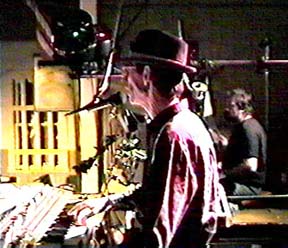
Age 37, in Nebraska
When I
accepted the job at USU, I took a break from bands, and
became involved with a small community theater group in
Box Elder County called StageStop Theatre. I was
cast as a lead character in many plays, including several
musicals, and I also arranged and recorded several
soundtracks for musicals, including The Sound of Music and
Big River.


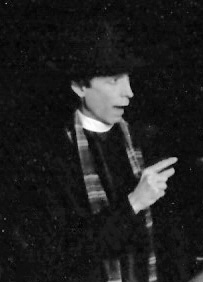

on stage at StageStop Theatre, ages 38-40
I also
sang in the Northern Utah Chorale Society. And I
wrote some original hymns and did some nice arrangements
of sacred songs.
I like to keep learning new things. At the age of 47, I bought a bass guitar at a pawn shop and taught myself to play it. At the age of 52, I purchased a keytar and taught myself to play it. At the age of 55, I purchased my first Taylor and taught myself to play steel string acoustic guitar. At the age of 61, I purchased my first electric guitar and taught myself to play it.
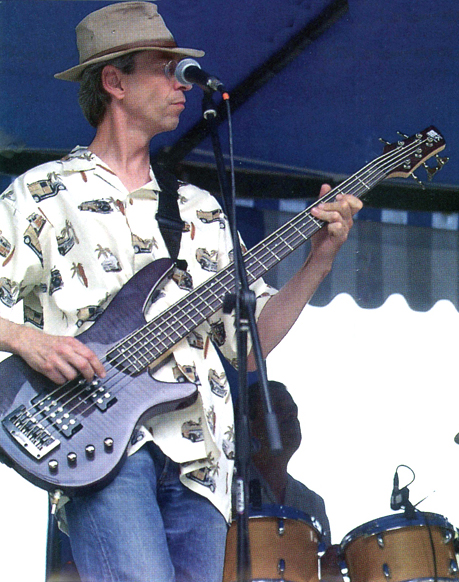
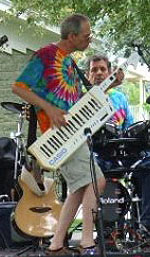
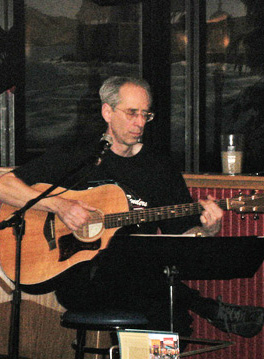

One of my first public performances on bass was at a concert of the Utah State University choirs. After that, I was a regular "guest artist" for them for many years. I have also written nearly a dozen choral arrangements for the USU choirs.
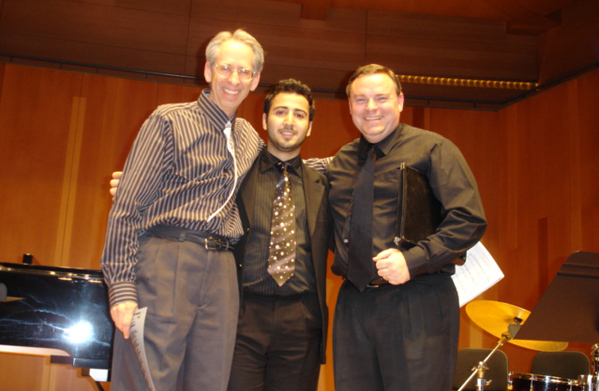
In 2003, I returned to playing in bands and formed The Fender Benders classic rock band.
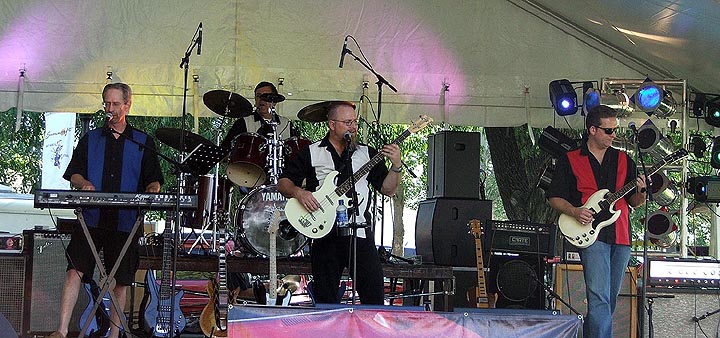
The Fender Benders performing in 2005
The Fender Benders has been going strong now for two decades.
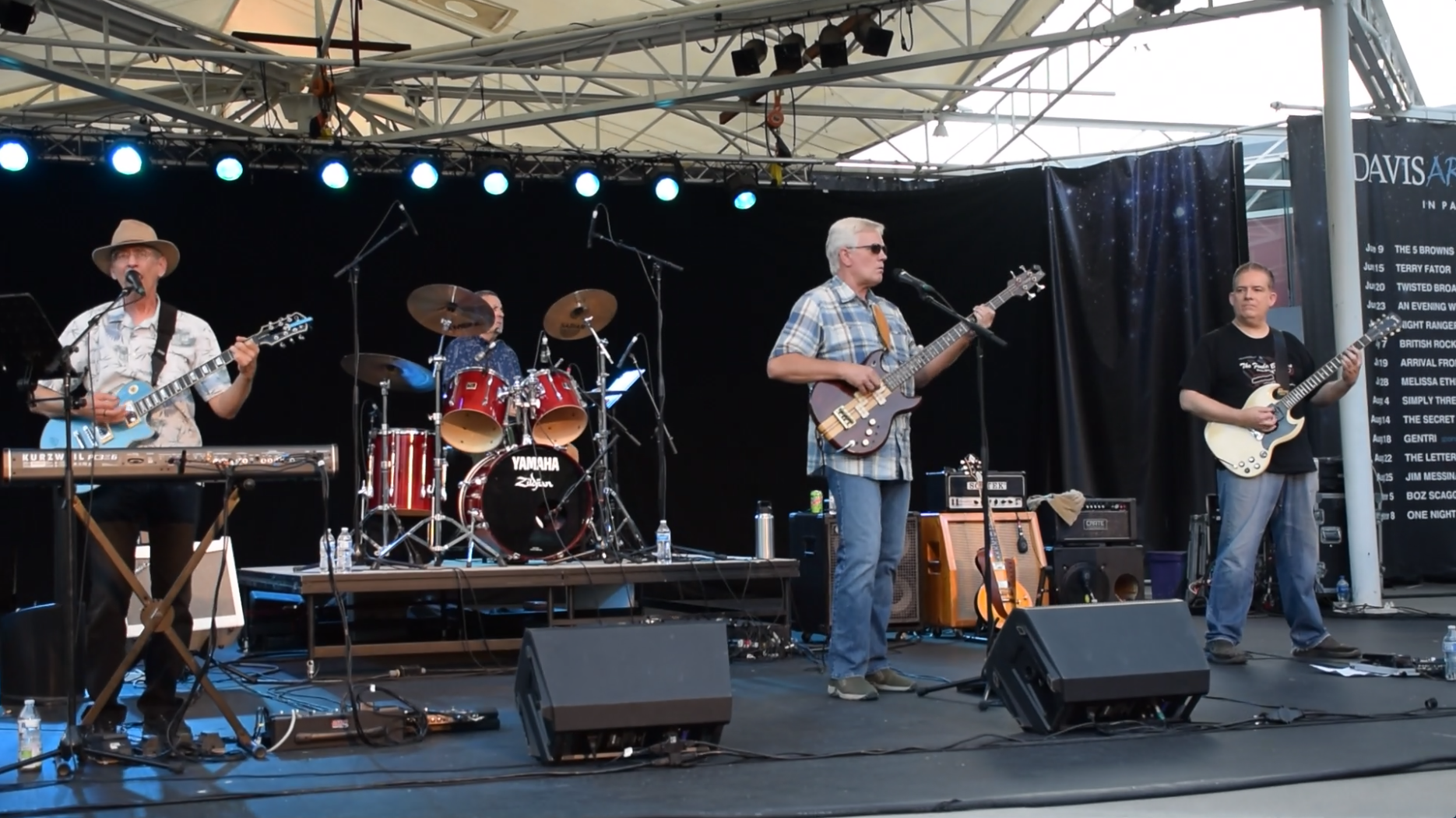
The Fender Benders performing in 2018
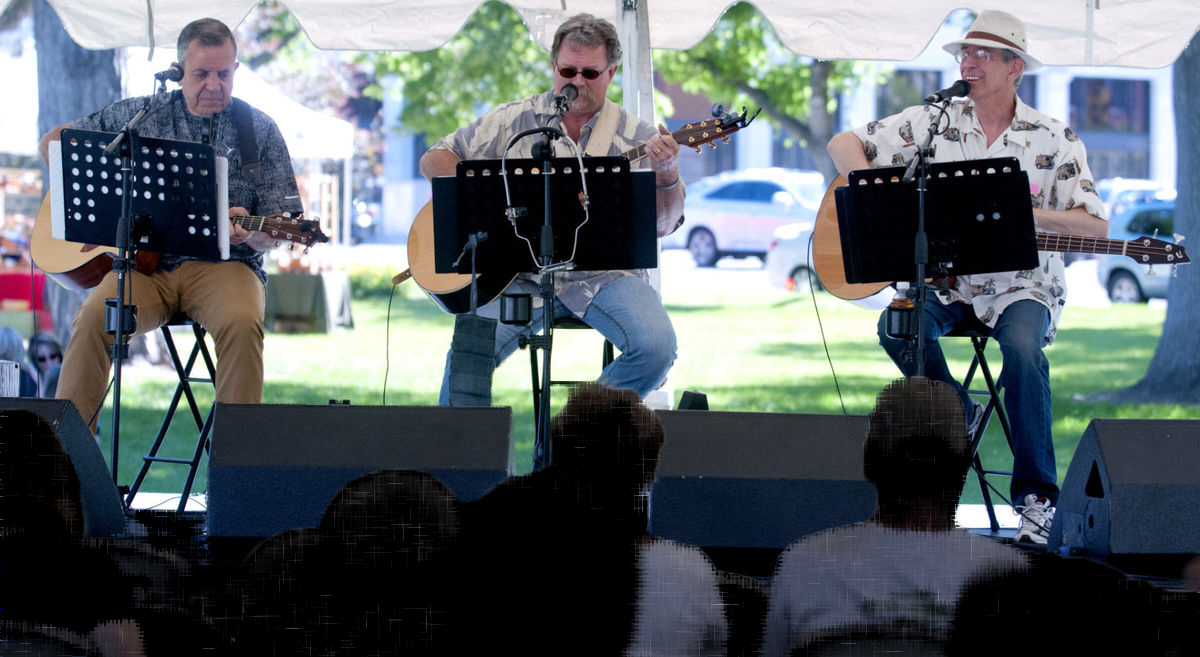
Relic
and I perform with Cristina Edlund, in a female vocalist and piano duo.
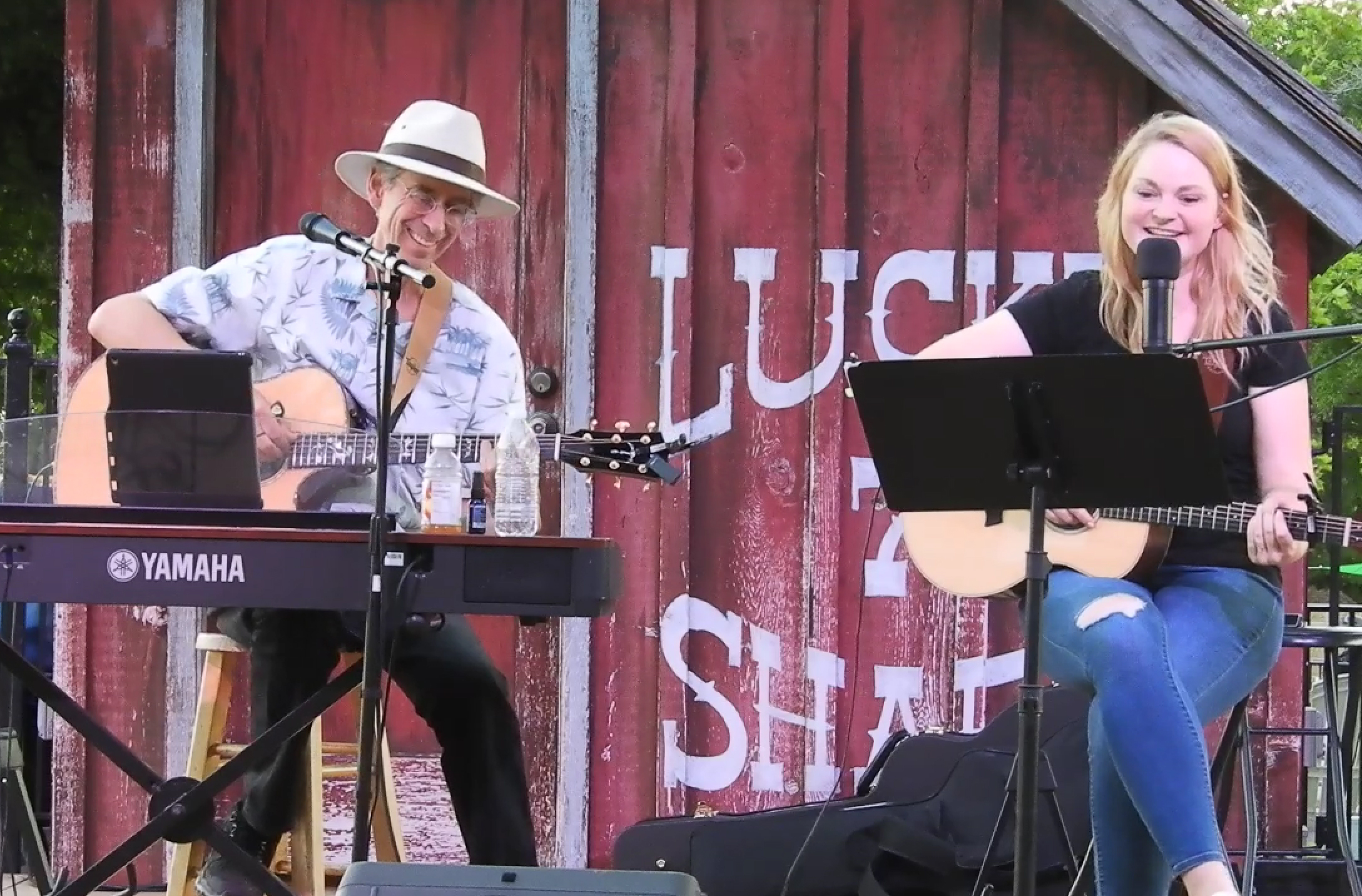
I have also performed with many other groups and artists, including Brandon and Kenzie Lee's Fibonacci concert series.
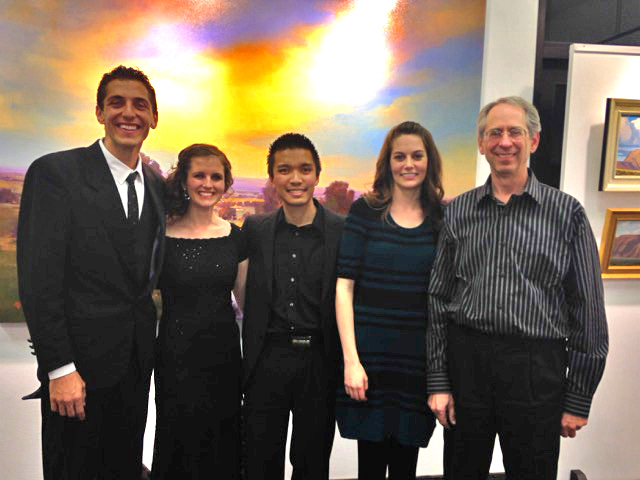
Brandon Lee & Friends
In 2012, I finally returned to my favorite career, teaching music lessons. And I've been smiling ever since! I enjoy teaching others the musical performance skills I have accumulated over my lifetime. And I do my best to avoid the aspects of music lessons that I did not enjoy when I was young.

At age eight, I started classical piano lessons, and continued for the next eight years. For six of those years, I studied under one of the most respected teachers in the Salt Lake valley. Although I was honored to have been accepted as one of her students, much of the time I felt like a square peg in a round hole.

Age 13
Because I loved music, I didn't give up. But sometimes I felt like I was beating my head against a brick wall. For example, I couldn't figure out an intuitive system for learning the notes in the grand staff and finding them quickly on the piano, let alone how to read the notes above and below the staff. The "Every Good Boy Does Fine" type tricks were not intuitive for me. It was just kind of expected that I would know all the notes. As I progressed, more and more pieces had notes high above the top of the staff, and I found myself just guessing what they were, or if that didn't work, counting lines and spaces.
I discovered that if I was familiar with the assigned piece I could learn it much faster... and I also liked the piece much better. I didn't know it then, but I was using a combination of ear and reading. My teacher knew exactly what was going on, and she did not like it at all! She tried in vain to get me to stop relying on my ear and to just use my eyes and play what was on the page by rote. She refused to play pieces for me when she assigned them, and acted like I was a horrible student for asking her to do so. If we had had the Internet in those days, I could have searched YouTube for each piece and listened to it a couple of times before trying to learn it, but we didn't. And so I suffered, and never reached my potential.
Even though I struggled and eventually quit lessons at age 16 because of my frustration with the structured curriculum, the impersonal teaching style, and the classical-only repertoire, it wasn't all bad. I am very thankful to my piano teacher for drilling into me excellent technique (hand and body position, relaxed wrists, curved fingers, and correct fingering).
In sixth grade, I composed my first piano solo piece. At the time, I was the pianist in the elementary school orchestra, and decided to write an arrangement of the song for the orchestra: first and second violin, viola, cello, bass, and piano. The teacher was impressed, and the orchestra learned and performed the song.
In seventh grade, I did my first recording session of an original composition (on a borrowed reel-to-reel two-track tape recorder, so I could record piano on one track and organ on the other--that was really high tech in 1966!)
During my Junior High years, many evenings, when my parents thought I was asleep, I often laid in bed with my "transistor radio" pressed against my ear, at a low volume, listening to the amazing songs of the late 1960s. The next day, I would listen to the radio, hoping a certain song would come on, and when it did I would record it onto a small reel-to-reel tape recorder (and later, onto a cassette tape). (I had no money to purchase the records and, of course, there was no Apple Music, YouTube, or Spotify.) Then I would take the tape recorder downstairs to the piano and try to play along with it to learn the song. Through trial and error, I invented a system: I would press the "play" button, listen to the first chord of the song, and stop the tape. Then I would hum the top note and find it on the piano. Then I'd rewind the tape, play that one chord again then stop the tape, listen for the bass note, hum it, and find it on the piano. Then it was a simple matter of experimentation to find the third note of the chord. Then I'd repeat the process for the second chord in the song. Before long, I progressed to the point where I could find all three notes at the same time, and soon I was able to listen to a measure at a time, then a line at a time, and eventually an entire verse of a new song, and reproduce it on the piano without difficulty. I even got the the point where I could "see" the chords in my mind when I wasn't sitting at a piano. Sometimes I was able to anticipate the next chord of a song when hearing it for the first time. I discovered how to invert chords, as well as the different types of chords, and chord progression patterns, all on my own. Because I couldn't sing as high as most of the records, I was also forced to learn to transpose so I could sing the songs. Nobody taught me any of that stuff. I just figured it out on my own.
Likewise, nobody ever explained to me how to write down any of this cool stuff I was discovering. Then at age 17, I bought my first guitar and taught myself to play it. That is when I learned about chord charts, which are commonly used with guitar. It didn't take long for me to figure out that I could also write chord charts for the popular songs I was learning by ear on the piano.

Age 17, with my little brother
During the latter years of my classical piano training, I was also expanding my classical musical knowledge by playing viola for four years in my junior high and high school orchestras.
In my junior year of high school, I attended a concert that changed my life. The University of Utah a'Cappella Choir was on tour in Germany, where I happened to be living for a few months. I had never before heard a'Cappella choral music, and it absolutely thrilled me to the core of my soul. That night, I said to my self, "Someday, I'm going to be in that choir." Upon my return to Utah, I quit the orchestra and signed up for high school concert choir for my senior year.
At age 19, I volunteered to serve a mission for my church and spent two years in Arizona and Nevada. While serving in Las Vegas, there was a beautiful, 11-rank pipe organ in one of the church buildings, and I fell in love with the sound of it. I became so fascinated with it that, on preparation days, when the other missionaries were in the gym playing basketball, I was in the chapel, teaching myself to play that organ. Although I had not liked Bach piano pieces, I discovered that I loved his organ pieces, and learned several of his preludes and fugues. (Since then, I have been the main organist in the church congregation wherever I have lived. Although I have never had an organ lesson in my life, I have been told by many people on countless occasions that I am one of the best organists they have ever heard.)
When I arrived at the University of Utah at the age of 21, I decided to major in accounting. In hindsight, I'm not sure if that was a good decision. My thinking was that I could always do music for fun, but I needed to feed my future family. So I followed my brain instead of my heart, and pushed through a five year bachelors/masters accounting program in accounting in 3 1/2 years, graduating magna cum laude. However, I never stopped studying music. I took a few courses in music theory and pedagogy, and sang in a couple of excellent choirs, in one of which I was asked to be the assistant conductor. Finally, in my master's year, I achieved my goal of being accepted into the University of Utah a'Cappella Choir.

Age 22, playing at a wedding reception
I put myself through college with money earned by playing piano and organ for weddings, and by playing in bands. I was a member of several bands, none of which was particularly good, but they gave me some performing experience. Things changed during my masters' year, when I joined a Top 40 cover band named Christopher that became one of the top three bands in the Salt Lake valley in the early 1980s. That band was extremely demanding, learning several new songs each week. Of course, there was no sheet music, so that experience further developed and refined my ability to learn songs by ear. And the vocal harmonies in that band were extremely intricate and precise, which further developed my voice and my understanding of harmony.

Age 28, playing with Christopher, in the Hotel Utah Grand Ballroom
(where the theater is in the Joseph Smith Memorial building today)

My keyboard setup in the 1980s was identical to that of the keyboard player for Journey,
including a Yamaha Electric Grand piano and a Prophet V synthesizer
Several years after my graduation from the U of U, I became disillusioned with accounting and decided to pursue a career in music. I built a small 8-track recording studio and composed radio jingles. I scored films for the BYU Motion Picture Studio, and started a video production company. I also taught "play by ear" and "play in a band" piano lessons to teenage students who already knew how to play piano but who, like me, had become frustrated with classical pieces and quit taking lessons. I taught my students what I had learned about playing by ear and making chord charts. I developed my own curriculum and materials and helped many aspiring rock and roll musicians to develop their skills. It was kind of an early version of School of Rock. That experience proved to me that playing by ear is not something you are born with and that most piano students can be taught how to do it.

My logo from the 1980s
My dream career was short-lived. After a few years, family circumstances forced me to abandon my studio, video production company, band, and teaching, and move to California, where I ended up back in accounting. Several years later, I pursued a Ph.D. in business at the University of Nebraska. Upon graduation, I accepted a position in the School of Accountancy at Utah State University, where I taught for 15 years.
(Over the years, many people who have known me in musical circles, when they have learned I hold a Ph.D. and that I taught at USU, have automatically assumed my degree was in music and that I taught in the music department at USU. The level of my knowledge and skills in music are such that people are very surprised to learn my degrees are in business.)
During my years in California and Nebraska, I kept playing in bands. One of the better ones was during my Ph.D. program, when I played with a classic rock band in Lincoln, Nebraska, called The Rockerfellers.

Age 37, in Nebraska




on stage at StageStop Theatre, ages 38-40
I like to keep learning new things. At the age of 47, I bought a bass guitar at a pawn shop and taught myself to play it. At the age of 52, I purchased a keytar and taught myself to play it. At the age of 55, I purchased my first Taylor and taught myself to play steel string acoustic guitar. At the age of 61, I purchased my first electric guitar and taught myself to play it.




One of my first public performances on bass was at a concert of the Utah State University choirs. After that, I was a regular "guest artist" for them for many years. I have also written nearly a dozen choral arrangements for the USU choirs.
with Aram Arakelyan and Dr. Cory Evans after
a performance with the USU choirs
In 2003, I returned to playing in bands and formed The Fender Benders classic rock band.

The Fender Benders performing in 2005
The Fender Benders has been going strong now for two decades.

The Fender Benders performing in 2018
In addition, I am a member
of several other musical performing acts, including Relic which
is basically the three original members of The Fender
Benders playing "unplugged" oldies with acoustic
guitars,

Relic
and I perform with Cristina Edlund, in a female vocalist and piano duo.

Cristina & Irv
I have also performed with many other groups and artists, including Brandon and Kenzie Lee's Fibonacci concert series.

Brandon Lee & Friends
In 2012, I finally returned to my favorite career, teaching music lessons. And I've been smiling ever since! I enjoy teaching others the musical performance skills I have accumulated over my lifetime. And I do my best to avoid the aspects of music lessons that I did not enjoy when I was young.